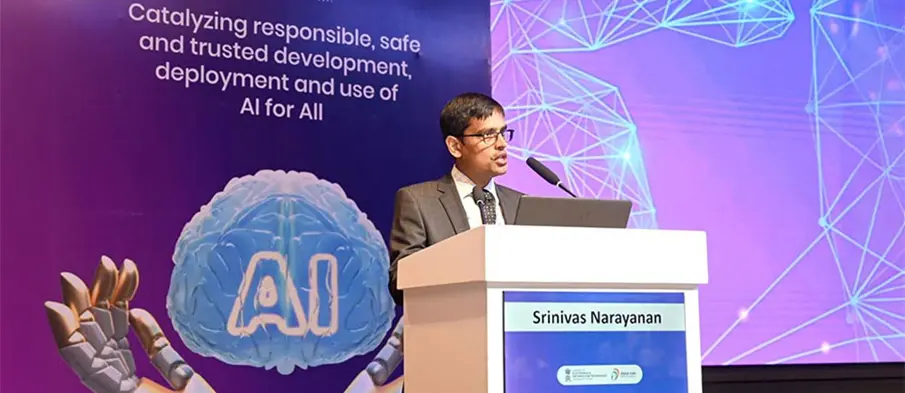
The inaugural panel discussion at the Global India AI Summit 2024 marked a significant milestone in India’s AI journey. The session by Mr. Srinivas Narayanan, Vice President, OpenAI focused on the expansive vision and structured plan of the India AI Mission, highlighting the seven pillars foundational to India’s AI roadmap.
The Seven Pillars of the India AI Mission
The India AI Mission is structured around seven critical pillars:
- IndiaAI Compute Capacity: Establishing robust and scalable infrastructure to support AI development.
- IndiaAI Innovation Centre: Developing indigenous Large Multimodal Models (LMMs) and domain-specific foundational models.
- India AI Datasets Platform: Creating and curating comprehensive non-personal datasets to fuel AI advancements.
- India AI Application Development Initiative: Fostering innovation in AI applications, emphasizing real-world use cases.
- IndiaAI Future Skills: Building a skilled workforce proficient in AI and machine learning technologies.
- IndiaAI Startup Financing: Encouraging and supporting startups to innovate within the AI space.
- Safety and Trusted AI: Ensuring AI developments are safe, ethical and trustworthy.
The core pillars of the India Innovation Center aim to develop AI models specifically tailored for India while nurturing unique AI talent to advance the nation’s AI capabilities. The mission’s guiding principle, “Make AI in India and make AI for India,” emphasizes creating AI technologies that address India’s distinct needs and challenges, ensuring inclusivity and widespread benefits.
A crucial part of this mission involves democratizing government data by anonymizing, annotating, and labeling it to build a valuable resource pool for advanced AI systems. With data being a vital asset for AI development, India is positioned to fully leverage this potential.
The discussion acknowledged that the upcoming AI revolution could mirror the transformative impact of the Industrial Revolution. India’s comprehensive strategy, which includes enhancing computing infrastructure, datasets, foundational models, skill development, application innovation, and ethical considerations, aims to establish the nation as a future leader in AI.
The panel outlined four key objectives:
- Understanding global insights on large language models.
- Addressing India’s linguistic and cultural diversity.
- Tackling ethical concerns.
- Exploring collaborative opportunities with academia, industry, and startups.
The session emphasized the need for collaboration and a tailored approach to drive India’s AI ambitions, ensuring that AI benefits every sector and reaches all corners of society.
The India Innovation Center’s focus on creating AI models tailored for India and nurturing local talent is crucial for advancing the nation’s AI capabilities. By emphasizing the principle “Make AI in India and make AI for India,” the initiative ensures that AI technologies address India’s unique needs and challenges. The mission’s efforts in democratizing government data and implementing a comprehensive strategy reflect India’s potential to lead in AI. With clear objectives in global insights, diversity, ethics, and collaboration, the panel underscored the importance of a coordinated approach to maximize AI’s benefits across all sectors and regions of society.




